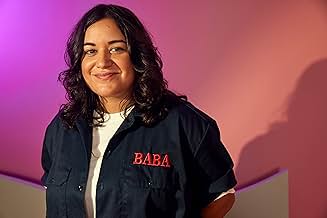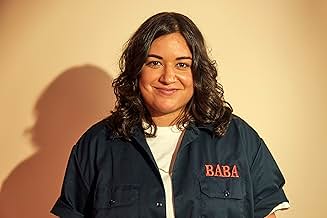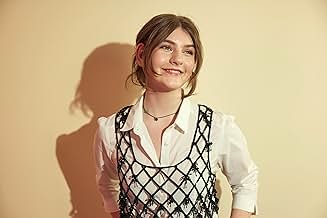VALUTAZIONE IMDb
6,4/10
4216
LA TUA VALUTAZIONE
Sam, una cabarettista alle prese con il disturbo da stress post-traumatico, valuta se partecipare o meno alla ricerca di un'adolescente scomparsa a cui faceva la babysitter.Sam, una cabarettista alle prese con il disturbo da stress post-traumatico, valuta se partecipare o meno alla ricerca di un'adolescente scomparsa a cui faceva la babysitter.Sam, una cabarettista alle prese con il disturbo da stress post-traumatico, valuta se partecipare o meno alla ricerca di un'adolescente scomparsa a cui faceva la babysitter.
- Regia
- Sceneggiatura
- Star
- Premi
- 8 candidature totali
Recensioni in evidenza
Sam Cowell (Rachel Sennott) is a stand-up comic with some success who does a bit of work as a nanny. Her 14 year old former charge Brooke Renner (Olga Petsa) is declared missing and shows up smashing her door in anger. Two years earlier, Sam gets hired by Cameron Renner (Jason Jones) to watch his 12 year old daughter while his wife is sick in the hospital.
The first half is intriguing. The mystery of the incident keeps my interest. Once it's revealed, the movie goes into Lifetime territories. The one glaring problem is the aunt's presence. Sam would notify her at every step. The fact that she exists is an exit ramp for Sam to take. That diminishes the intensity of the story. If she doesn't exist, Brooke would be running away from a foster home. The police could be less than co-operative. Then Sam would feel like she's Brooke's only hope. That would raise the intensity of the second half. As for Olga Petsa, she's a little old to play a 12 year old. Brooke's young age is very important to her feelings. Otherwise, Sennott is excellent. I can see this story working, but it needs some changes.
The first half is intriguing. The mystery of the incident keeps my interest. Once it's revealed, the movie goes into Lifetime territories. The one glaring problem is the aunt's presence. Sam would notify her at every step. The fact that she exists is an exit ramp for Sam to take. That diminishes the intensity of the story. If she doesn't exist, Brooke would be running away from a foster home. The police could be less than co-operative. Then Sam would feel like she's Brooke's only hope. That would raise the intensity of the second half. As for Olga Petsa, she's a little old to play a 12 year old. Brooke's young age is very important to her feelings. Otherwise, Sennott is excellent. I can see this story working, but it needs some changes.
IUTBF is a tough movie to love. I guess you would have to live in the disillusioned LA Gen Z bubble to understand any of the characters or their motivations. Cinema is best defined as an empathy creating machine but this movie made me feel nothing.
The issue is mostly the awkward, stilted conversations in the screenplay. The opaque plot doesn't help. The flashback scenes provide some drama but also make the whole film seem like a Greek tragedy.
The direction is actually fairly effective, the acting, however, is not. Some of the characters will be grating to a 'normal' audience. Hence the need for the bubble.
I never thought that a movie about a stand up comic could be so laugh free.
The issue is mostly the awkward, stilted conversations in the screenplay. The opaque plot doesn't help. The flashback scenes provide some drama but also make the whole film seem like a Greek tragedy.
The direction is actually fairly effective, the acting, however, is not. Some of the characters will be grating to a 'normal' audience. Hence the need for the bubble.
I never thought that a movie about a stand up comic could be so laugh free.
Comedy is inherent in calling on personal experiences for a joke. Humor is a defense mechanism and a willing tool to break the ice and even recover. Comedy is healing and is used significantly in the film I Used To Be Funny. In a somewhat dark comedy set against the backdrop of the #MeToo era, the film stars Rachel Sennott as a struggling comic battling PTSD who takes part in a search for a missing girl she used to nanny. The film tackles heavy subject matter with airy deftness, and what ties it together is Sennott's arresting performance. In an edgy and humorous film, I Used To Be Funny takes center stage as one of the year's best.
Full review @ Geek Vibes Network.
Full review @ Geek Vibes Network.
Ally Pankiw's feature debut "I Used to be Funny" competently explores fragile experiences of depression and PSTD, recovering from assault, and child endangerment with a tame dose of fragile drama, sprinkled with witty humour.
Pankiw's choice to present the story through sequencing between Sam's mission to find a missing Brooke, the young girl she nannied, and frequent flashbacks of memories of the two's once-close bond. While the concept of a non-linear narrative is meant to efficiently expand the dynamics and pasts of the characters and their journeys, which it technically achieves for the majority of the film. The beginning of this sequence felt static as the vague nature that shrouded the connection between Sam, her trauma, and her past with Brooke, overstayed its welcome in the first third of the story. However, the pace thankfully accelerates once the first clues of Brooke's disappearance are uncovered.
Some elements of the film at times, lean too hard into melodrama that lacks actual substance, especially in the vague and unmoving first third of the film. Cuts to some flashbacks that felt somewhat cliche a script that at times felt too expository, and perhaps two-too-many Phoebe Bridgers needle drops; tools that ask the audience to engage with the characters and the mysterious tragedy that haunts them. These elements may have been appropriate in the context of a television episode, considering Pankiw's background in TV direction, but unfortunately fell flat within a full-length feature film.
Amidst these faults, one of the film's greatest strengths is its talented cast. Rachel Sennott's has not only cemented herself as a star of off-beat and relatable comedy but also demonstrated a striking capacity for performances filled with intense vulnerability, harmoniously embodying all relevant elements of the tragicomedy genre. Her ability to foster chemistry with the rest of the cast only adds further dimension to the sorrow and humor that defines her character's journey.
Overall, I Used to Be Funny poses an intimate image of how trauma can take control of our lives and sense of self-worth. While bleak, the potential for healing is also presented as the empathetic and hopeful conclusion to Sam and Brooke's journey. While the film's approach at times lacks the ingenuity and impact it clearly intended to bring, it remains that Pankiw's strength lies in how she stays firm with the difficult themes and issues she addresses.
Pankiw's choice to present the story through sequencing between Sam's mission to find a missing Brooke, the young girl she nannied, and frequent flashbacks of memories of the two's once-close bond. While the concept of a non-linear narrative is meant to efficiently expand the dynamics and pasts of the characters and their journeys, which it technically achieves for the majority of the film. The beginning of this sequence felt static as the vague nature that shrouded the connection between Sam, her trauma, and her past with Brooke, overstayed its welcome in the first third of the story. However, the pace thankfully accelerates once the first clues of Brooke's disappearance are uncovered.
Some elements of the film at times, lean too hard into melodrama that lacks actual substance, especially in the vague and unmoving first third of the film. Cuts to some flashbacks that felt somewhat cliche a script that at times felt too expository, and perhaps two-too-many Phoebe Bridgers needle drops; tools that ask the audience to engage with the characters and the mysterious tragedy that haunts them. These elements may have been appropriate in the context of a television episode, considering Pankiw's background in TV direction, but unfortunately fell flat within a full-length feature film.
Amidst these faults, one of the film's greatest strengths is its talented cast. Rachel Sennott's has not only cemented herself as a star of off-beat and relatable comedy but also demonstrated a striking capacity for performances filled with intense vulnerability, harmoniously embodying all relevant elements of the tragicomedy genre. Her ability to foster chemistry with the rest of the cast only adds further dimension to the sorrow and humor that defines her character's journey.
Overall, I Used to Be Funny poses an intimate image of how trauma can take control of our lives and sense of self-worth. While bleak, the potential for healing is also presented as the empathetic and hopeful conclusion to Sam and Brooke's journey. While the film's approach at times lacks the ingenuity and impact it clearly intended to bring, it remains that Pankiw's strength lies in how she stays firm with the difficult themes and issues she addresses.
Powerful message and subject in this movie but the journey its a little tiresome, there is no real history here, its a basic movie, the protagonist is amazing but the rest of the cast are not very good in this, they are rookies I guess, they are not the best actors in here tbh, the way the story is told is kinda of make no sense just like this review, it's convoluted and not easy to follow but maybe im slow i don't know, the protagonist is a very funny stand up comedy artist and she is fighting some demons in this movie, and that's a very interesting thing to follow but the way its told through flashbacks it wasn't really neccesary, its hard to understand ok guys.
Lo sapevi?
- QuizDirector Ally Pankiw was dating Muna member Naomi McPherson during the production of the film, but have since broken up. Naomi is still second to the top of special thanks during credits, and two Muna songs feature during the film.
I più visti
Accedi per valutare e creare un elenco di titoli salvati per ottenere consigli personalizzati
- How long is I Used to Be Funny?Powered by Alexa
Dettagli
- Data di uscita
- Paesi di origine
- Lingua
- Celebre anche come
- Колись я була смішною
- Aziende produttrici
- Vedi altri crediti dell’azienda su IMDbPro
Botteghino
- Lordo Stati Uniti e Canada
- 171.756 USD
- Fine settimana di apertura Stati Uniti e Canada
- 29.499 USD
- 9 giu 2024
- Lordo in tutto il mondo
- 171.756 USD
- Tempo di esecuzione1 ora 45 minuti
- Colore
- Proporzioni
- 2.00 : 1
Contribuisci a questa pagina
Suggerisci una modifica o aggiungi i contenuti mancanti







































